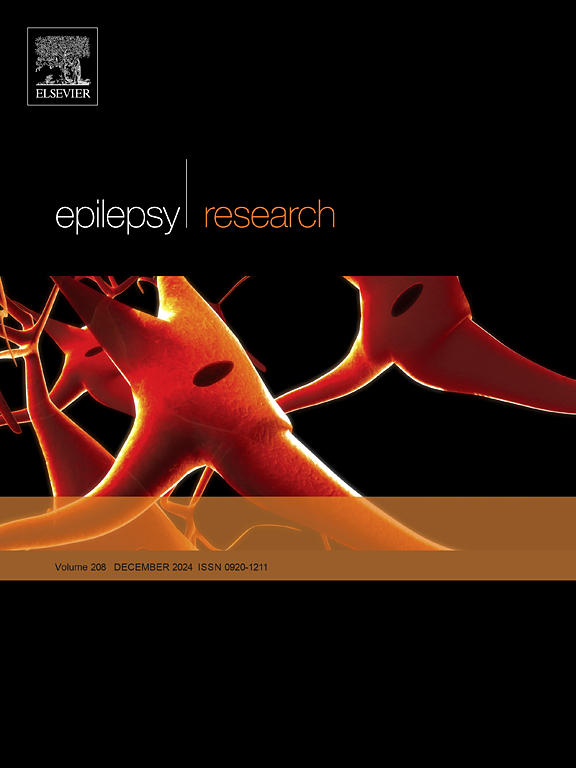难治性颞叶癫痫与执行控制相关的Theta功能连接改变
IF 2
4区 医学
Q3 CLINICAL NEUROLOGY
引用次数: 0
摘要
目的利用注意网络测试(ANT)和同步脑电图(EEG)记录,探讨颞叶难治性癫痫患者执行控制(EC)功能障碍的神经机制。方法研究对象分为三个人口统计学匹配组(n = 各20人):难治性颞叶癫痫(RE)、药物敏感性颞叶癫痫(DSE)和健康对照组(Ctrl)。参与者被指示执行ANT,同时记录头皮脑电图信号。从ANT任务执行过程中获取的脑电图数据计算theta波段功能连接。结果RE组EC表现明显下降。两组患者(RE/DSE)与健康对照组相比,全脑和EC网络额叶区域的theta波段功能连接强度显著降低。值得注意的是,与DSE组相比,RE组在EC网络中表现出全脑和额叶θ的连通性降低。此外,控制组和DSE组额叶θ连接强度与EC_effect呈正相关(r = -0.658,p = 0.002;r = -0.540,p = 0.014)。相比之下,RE组的EC网络theta连通性与行为表现之间没有显著关联(p >; 0.05)。结论顽固性癫痫患者表现为脑电图行为障碍,并伴有额叶区theta-band功能连通性减弱。额波连接减弱可能是这类患者脑电图功能障碍的基础。本文章由计算机程序翻译,如有差异,请以英文原文为准。
Theta functional connectivity alterations related to executive control in refractory temporal lobe epilepsy
Aims
Using the attention network test (ANT) with simultaneous electroencephalography (EEG) recordings, this study investigated the neural mechanisms underlying executive control (EC) dysfunction in patients with temporal lobe refractory epilepsy.
Methods
Participants comprised three demographically matched groups (n = 20 each): refractory temporal lobe epilepsy (RE), drug-sensitive temporal lobe epilepsy (DSE), and healthy controls (Ctrl). Participants were instructed to perform the ANT while scalp EEG signals were simultaneously recorded. Theta-band functional connectivity was computed from EEG data acquired during ANT task execution.
Results
The RE group exhibited significant impairment in EC performance. Theta-band functional connectivity strength in the whole-brain and frontal regions of the EC network was significantly reduced in both patient groups (RE/DSE) versus healthy controls. Notably, the RE group demonstrated reduced whole-brain and frontal theta connectivity within the EC network relative to the DSE group. Furthermore, frontal theta connectivity strength positively correlated with EC_effect in both Ctrl and DSE groups (r = -0.658, p = 0.002; r = -0.540, p = 0.014). In contrast, no significant association was observed between EC network theta connectivity and behavioral performance in the RE group (p > 0.05).
Conclusion
Patients with refractory epilepsy exhibited impaired EC behavioral performance, concomitant with reduced theta-band functional connectivity strength in frontal regions. This diminished frontal theta connectivity may underlie EC dysfunction in this patient population.
求助全文
通过发布文献求助,成功后即可免费获取论文全文。
去求助
来源期刊

Epilepsy Research
医学-临床神经学
CiteScore
0.10
自引率
4.50%
发文量
143
审稿时长
62 days
期刊介绍:
Epilepsy Research provides for publication of high quality articles in both basic and clinical epilepsy research, with a special emphasis on translational research that ultimately relates to epilepsy as a human condition. The journal is intended to provide a forum for reporting the best and most rigorous epilepsy research from all disciplines ranging from biophysics and molecular biology to epidemiological and psychosocial research. As such the journal will publish original papers relevant to epilepsy from any scientific discipline and also studies of a multidisciplinary nature. Clinical and experimental research papers adopting fresh conceptual approaches to the study of epilepsy and its treatment are encouraged. The overriding criteria for publication are novelty, significant clinical or experimental relevance, and interest to a multidisciplinary audience in the broad arena of epilepsy. Review articles focused on any topic of epilepsy research will also be considered, but only if they present an exceptionally clear synthesis of current knowledge and future directions of a research area, based on a critical assessment of the available data or on hypotheses that are likely to stimulate more critical thinking and further advances in an area of epilepsy research.
 求助内容:
求助内容: 应助结果提醒方式:
应助结果提醒方式:


